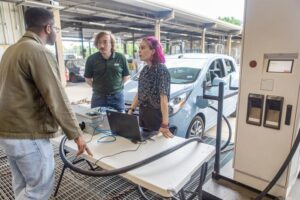AI for rewilding farmland in North Yorkshire
‘Make it Wild’ project partners with AgriSound on AI algorithm to demonstrate the biodiversity benefits of rewilding schemes
‘Rewilding’ is a form of conservation, based on the idea that if we leave the natural world alone, it can repair damage to ecosystems and restore landscapes, building up biodiversity. Sometimes, that can include reintroducing species of animals or insects that have once lived in a particular area, or planting new trees, but generally the idea is to leave well alone.
So how do we know if it works?
The ‘Make it Wild’ programme is demonstrating that it does with data-driven evidence provided by AI. To do this, York-based tech company AgriSound has provided four bespoke ‘Polly’ bioacoustic listening devices to monitor biodiversity in sites managed by Make it Wild. In one such site – Banks Wood in Harrogate – there’s now good evidence that rewilding has led to more pollinators such as bees and significantly greater biodiversity than is found on conventionally farmed land.
At Banks Wood, rewilding efforts included removing sheep, planting numerous trees and restoring diverse habitats – among them semi-improved pasture, gorse, upland scrub, small streams and ancient woodlands. The tech employed to measure the effectiveness of these efforts is cutting edge.
The AI tracking algorithms recognise the sounds made by pollinators, enabling Make it Wild to track which areas of the site have the highest numbers. Gathered in real time, the data can also be used to suggest and check the effectiveness of land management strategies. Pollinator activity has increased by 38% since rewilding started at Bank Woods.
AgriSound’s Polly listening devices have been widely employed in commercial, regenerative agriculture by food producers to help in commercial pollination and increasing crop yield, but this is the first time they’ve been applied to rewilding. But it’s significant that it so ably and quickly demonstrates the potential of rewilding for increasing biodiversity.
Helen Neave, co-founder of Make it Wild, says: ‘We know that pollinators are in deep trouble, and they are a crucial part of our ecosystem. In order to support our rewilding efforts and increase pollinator populations, we’re very much anticipating the use of data from these Polly devices.
‘We are the only rewilding project to be using AgriSound’s monitoring devices, which can provide a crucial source of data on biodiversity. Rewilding is often mis-understood, and seen to threaten conventional farming, but we believe that the two philosophies of land management can work together.
‘We are in the midst of the sixth mass extinction, and eager to demonstrate how we can make a difference in our impact on nature to reduce destruction and loss of habitat. The number one focus of our rewilding project is to increase biodiversity, and gathering data to show the positive results will be fundamental to our future success. We hope our partnership with AgriSound will underscore the importance of gathering demonstrable data for such initiatives and lay the ground for others to follow suit.’
Casey Woodward, CEO of AgriSound, adds: ‘We’re constantly developing our AI bioacoustic monitoring technology to support an increasing variety of bespoke executions and we are excited to see how our data-driven approach to pollinator monitoring can be used in rewilding projects to protect and boost biodiversity.
‘We’re being asked to develop algorithms for increasingly inventive uses of the Polly in order to protect pollinators alongside our regenerative farming projects, and this rewilding project sets an exciting precedent for how our bioacoustic monitoring AI technology can be used for conservation.’
In related news:
Tackling CO2, water pollution and threats to biodiversity – from space
Rich data on global biodiversity loss – from systems we’re already using

















Leave a Reply